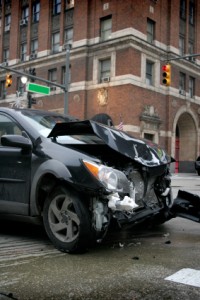Will A ‘Hit and Run’ Raise Your Rates?
How a Hit and Run Incident Affects Your Auto Insurance – You Might Be Surprised
Unfortunately, ‘Hit and Run’ accidents are a fact of life on the road. Hit and Run incidents are car accidents where one or more parties fails to stop, provide information, and render aid when necessary. In other words, if you have an accident with another vehicle and drive off – even if the other car was parked – you were involved in a Hit and Run accident.
There are many Hit and Run incidents every year on US highways. According the National Highway Traffic Safety Administration (NHTSA) in 2003-2006, one in eight accidents were Hit and Run. It’s estimated there are over 700,000 Hit and Run incidents every year in the United States. If you haven’t been involved in one yet, chances are you will be in one in your lifetime.
There are two parties in a Hit and Run accident: the person “hitting and running” and the other driver and/or car. Hit and Run accident affects both party’s auto insurance rates differently.
Rates For the Person “Hitting & Running”
If you caused an accident and drove away, you are responsible for a hit and run – even if the other vehicle was unoccupied. If the accident is ever traced back to you, then your insurance could charge you with an at-fault incident. This will probably be a surcharged incident which would result in higher premiums.
Hit and Run incidents are more serious than regular at-fault accidents. It could stay on your driving record for 5-7 years, depending on your state. If your insurance company discovers it’s a Hit and Run, they may also cancel your coverage. This would mean even higher premiums at your next carrier.
Every driver should know a driver’s responsibility in any accident – stop your car at a nearby, safe place, check on the other driver, and give them your information. If you drive off, you could be in more trouble than just rising insurance rates. If the victim is injured or dies as a result of the accident, police will investigate. If you’re guilty of a Hit and Run traffic death, the courts could find you guilty of felony manslaughter. You should contact an attorney in that situation.
Bottom line: if you’re involved in an accident, do the right thing. Stop, provide your information to the other driver, and render aid when necessary – regardless of who’s at fault.
Rates for the Victim of a Hit and Run
If you are the victim of a Hit and Run incident, your rates should be unaffected. Hit and Run accidents are common and insurance companies usually do not fault the other driver for the incident.
However, whether the incident will be covered is a different question. There are two coverages that would cover a Hit and Run: Uninsured/Underinsured Motorist (UM) and Collision. Insurance companies offer Uninsured Motorist coverage for times like these. Hit and Run incidents are covered minus your deductible in most cases. If you do not carry UM, then your Collision coverage should pick up the tab – minus your deductible. That’s one of the reasons you should carry UM or Collision at all times.
The particular coverage that would be used to cover your damages from a hit and run accident all depends on the state that you live in and also your insurance company you have coverage with. For example, in the state of Washington a hit and run accident is covered under the UM coverage and you are required to file a police report. If the driver that hit you is identified the damage is still covered under the UM coverage, but you are subject to a lower deductible than you would be if the other driver was never identified. In the state of Idaho some carriers do not even sell UM coverage and all hit and run accidents are covered under the collision coverage.
Regardless, if you’re involved in a Hit and Run, contact your insurance company. They will provide the best advice for handling your claim. Depending on the severity of the situation, they could also provide legal counsel.
If you have experience with a Hit and Run accident, feel free to leave a comment.





